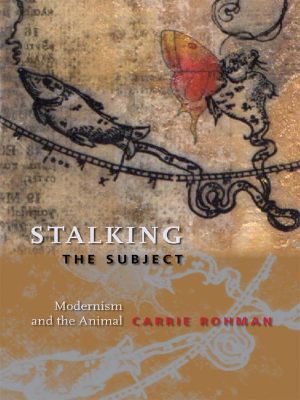Stalking the Subject

- Authors
- Rohman, Carrie
- Publisher
- Columbia University Press
- Tags
- nature , animal rights , literary criticism , general , lit000000 , nat039000
- ISBN
- 9780231518567
- Date
- 2008-11-05T00:00:00+00:00
- Size
- 1.75 MB
- Lang
- en
Drawing on the thought of Jacques Derrida and Georges Bataille, Carrie Rohman outlines the complex philosophical and ethical stakes involved in theorizing the animal in humanism, including the difficulty in determining an ontological place for the animal, the question of animal consciousness and language, and the paradoxical status of the human as both a primate body and a "human" mind abstracting itself from the physical and material world.
Human and animal subjectivity converge in a historically unprecedented way within modernism, as evolutionary theory, imperialism, antirationalism, and psychoanalysis all grapple with the place of the human in relation to the animal. Drawing on the thought of Jacques Derrida and Georges Bataille, Carrie Rohman outlines the complex philosophical and ethical stakes involved in theorizing the animal in humanism, including the difficulty in determining an ontological place for the animal, the question of animal consciousness and language, and the paradoxical status of the human as both a primate body and a "human" mind abstracting itself from the physical and material world. Rohman then turns to the work of Joseph Conrad, D. H. Lawrence, H. G. Wells, and Djuna Barnes, authors who were deeply invested in the relationship between animality and identity. The Island of Dr. Moreau embodies a Darwinian nightmare of the evolutionary continuum; The Croquet Player thematizes the dialectic between evolutionary theory and psychoanalysis; and Women in Love, St. Mawr, and Nightwood all refuse to project animality onto others, inverting the traditional humanist position by valuing animal consciousness. A novel treatment of the animal in literature, Stalking the Subject provides vital perspective on modernism's most compelling intellectual and philosophical issues.
Human and animal subjectivity converge in a historically unprecedented way within modernism, as evolutionary theory, imperialism, antirationalism, and psychoanalysis all grapple with the place of the human in relation to the animal. Drawing on the thought of Jacques Derrida and Georges Bataille, Carrie Rohman outlines the complex philosophical and ethical stakes involved in theorizing the animal in humanism, including the difficulty in determining an ontological place for the animal, the question of animal consciousness and language, and the paradoxical status of the human as both a primate body and a human mind abstracting itself from the physical and material world. Rohman then turns to the work of Joseph Conrad, D. H. Lawrence, H. G. Wells, and Djuna Barnes, authors who were deeply invested in the relationship between animality and identity. The Island of Dr. Moreau embodies a Darwinian nightmare of the evolutionary continuum; The Croquet Player thematizes the dialectic between evolutionary theory and psychoanalysis; and Women in Love , St. Mawr , and Nightwood all refuse to project animality onto others, inverting the traditional humanist position by valuing animal consciousness. A novel treatment of the animal in literature, Stalking the Subject provides vital perspective on modernism's most compelling intellectual and philosophical issues.-- "Choice"